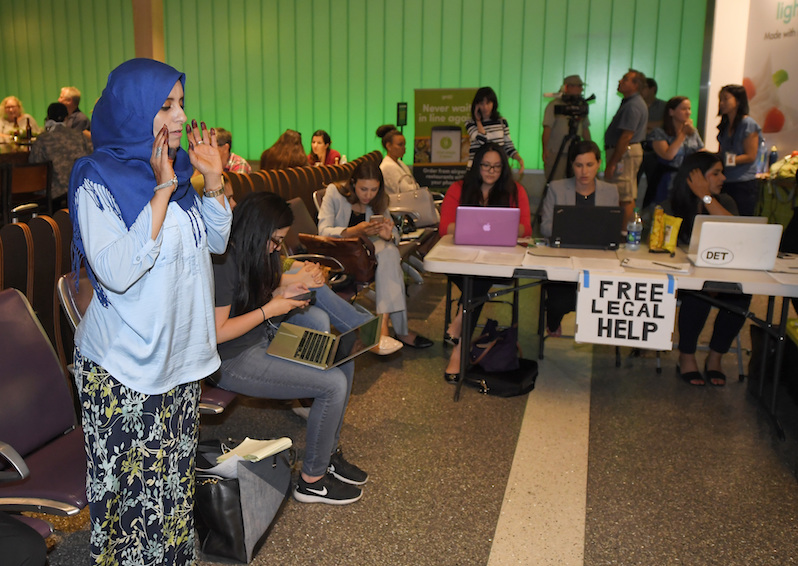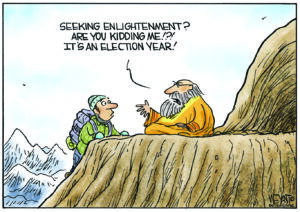Trump’s Travel Ban 2.0 Goes Into Effect
The ban has set the stage for a Supreme Court battle over executive powers later this year. (Pictured: A Muslim woman awaits a relative's arrival at the Los Angeles airport on Thursday.) A woman prays at Los Angeles International Airport on Thursday as she awaits her Yemeni mother's arrival from Jordan. (Mark J. Terrill / AP )
A woman prays at Los Angeles International Airport on Thursday as she awaits her Yemeni mother's arrival from Jordan. (Mark J. Terrill / AP )
A woman prays at Los Angeles International Airport on Thursday as she awaits her Yemeni mother’s arrival from Jordan. (Mark J. Terrill / AP )
The State Department on Wednesday issued new guidelines for revisions to the travel ban on people from six predominantly Muslim countries entering the United States. The stipulations went into effect at 8 p.m. Eastern time on Thursday.
According to The New York Times, the court said the ban could not be imposed on any person who had “a credible claim of a bona fide relationship with a person or entity in the United States” — language which raised concerns about how that phrase might potentially generate subjective interpretations and hair-splitting distinctions that could be at odds with each other.
The Times looked into these semantic issues and the White House’s attempts at clarification:
The Trump administration has now made the definition explicit.
According to a diplomatic cable obtained by The New York Times, “close family” is “defined as a parent (including parent-in-law), spouse, child, adult son or daughter, son-in-law, daughter-in-law, sibling, whether whole or half. This includes step relationships.”
But it went on to state that “close family” does not include “grandparents, grandchildren, aunts, uncles, nieces, nephews, cousins, brothers-in-laws and sisters-in-law, fiancés and any other ‘extended’ family members.”
It is not clear how the administration arrived at the new definitions.
The guidelines came after the U.S. Supreme Court on Monday paved the way for parts of the travel ban to remain, but it imposed limits during the interim before the court examines the scope of presidential power over the border in October.
The limits imposed resulted in a far less restrictive ban than the one Trump proposed his first week in office as well as the later, revised iteration. But still, it represents a small victory for the president, who was repeatedly shot down by lower courts for an attempt at a widespread ban on Muslims entering the country.
As the Times noted, the Supreme Court’s latest opinion “sets up a historic legal clash in which the justices will weigh the president’s power to set national security priorities against the need to protect individuals from discrimination based on their religious beliefs or national origin.”
Omar Jadwat of the American Civil Liberties Union told the paper he believes the newly issued guidelines are troubling, as they could create arbitrary definitions of family relationships. “[I]t means that everybody is going to be in the situation of kind of scrambling to understand whatever they [the State Department] put out, and work through the issues,” he said.
CNN reported that the reaction to Thursday night’s rollout of the new travel ban was relatively quiet compared with the public response to the administration’s first attempt, in January.
–Posted by Emily Wells.
Your support matters…Independent journalism is under threat and overshadowed by heavily funded mainstream media.
You can help level the playing field. Become a member.
Your tax-deductible contribution keeps us digging beneath the headlines to give you thought-provoking, investigative reporting and analysis that unearths what's really happening- without compromise.
Give today to support our courageous, independent journalists.









You need to be a supporter to comment.
There are currently no responses to this article.
Be the first to respond.